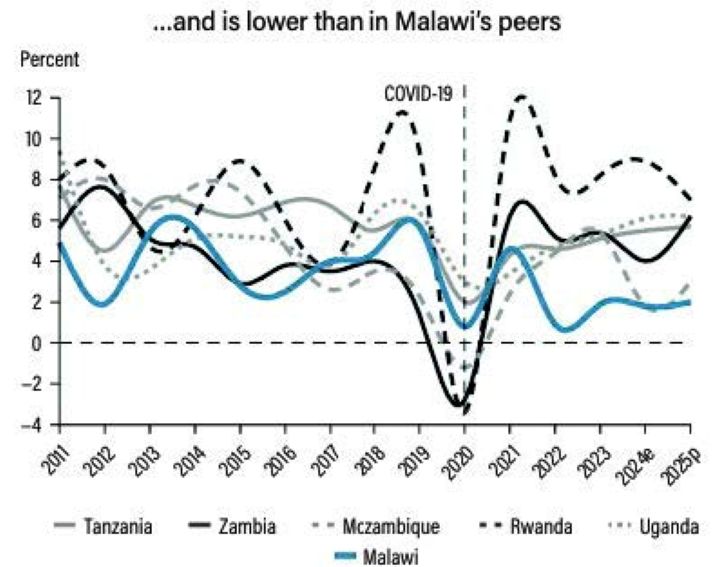Key Business Points
- Malawi’s economy is lagging behind regional peers due to stalled reform momentum, persistently high inflation, and mounting public debt, posing significant challenges to the country’s business community.
- The country’s fiscal deficit and public debt are of particular concern, with the deficit estimated at 8% of GDP and debt surpassing 90% of GDP, far above regional averages, making it essential for businesses to reassess their investment strategies.
- To turn things around, experts recommend implementing difficult reforms, including adopting a realistic exchange rate, cutting wasteful expenditure, and investing in sectors that create jobs and add value, such as kulima kwa mphatso (farming for profit) and biashara ya kulemeta ( informal trade).
The International Monetary Fund (IMF) has warned that Malawi’s economy is losing ground to its regional peers, citing stalled reform momentum, high inflation, and mounting public debt. According to the IMF’s Sub-Saharan Africa Regional Economic Outlook, Malawi’s growth rate is projected at 2.8% this year, significantly lower than the regional average of 4%. Inflation, currently at 28.7%, remains one of the highest in Africa, posing a significant challenge to businesses and consumers alike. The country’s fiscal deficit, estimated at 8% of GDP, is double the Southern Africa Development Community (Sadc) average, while public debt has surpassed 90% of GDP, far above the regional average.
Economists have identified several key areas that need to be addressed to reverse the trend. Overdependence on rain-fed farming makes the country vulnerable to climate shocks, while a chronic shortage of foreign exchange hinders businesses’ ability to import essential goods. Unsustainable government borrowing and sluggish policy execution are also major concerns. Experts urge the government to adopt a realistic exchange rate, cut wasteful expenditure, and invest in sectors that create jobs and add value, such as kulima kwa mphatso (farming for profit) and biashara ya kulemeta (informal trade). By doing so, Malawi can attract the foreign currency it desperately needs and make its exports competitive.
The Economics Association of Malawi president, Bertha Bangara-Chikadza, attributes the country’s struggles to deep-rooted structural vulnerabilities and ongoing macroeconomic instability. She emphasizes the need to diversify the economy and invest in sectors that create jobs and add value, such as ufufuwo (manufacturing) and biashara ya nje (international trade). Economist Gilbert Kachamba agrees, citing the importance of a predictable macroeconomic environment for attracting investment. He points to regional examples, such as Tanzania and Rwanda, which have shown that fiscal discipline, agricultural diversification, and investment in infrastructure can accelerate recovery. By following these examples and implementing necessary reforms, Malawi can kugwira mtanda (stand up) and regain its footing in the regional economy.
What are your thoughts on this business development? Share your insights and remember to follow us on Facebook and Twitter for the latest Malawi business news and opportunities. Visit us daily for comprehensive coverage of Malawi’s business landscape.
- Revitalizing Malawi’s Economy: Lower Food Prices Signal New Growth Opportunities - January 31, 2026
- Revitalizing Malawi’s Economy: Tackling Climate Related Underfunding for Sustainable Growth - January 30, 2026
- Navigating Malawi’s Fiscal Crossroads: Strategies for Business Resilience Amidst Rising Debt - January 29, 2026

